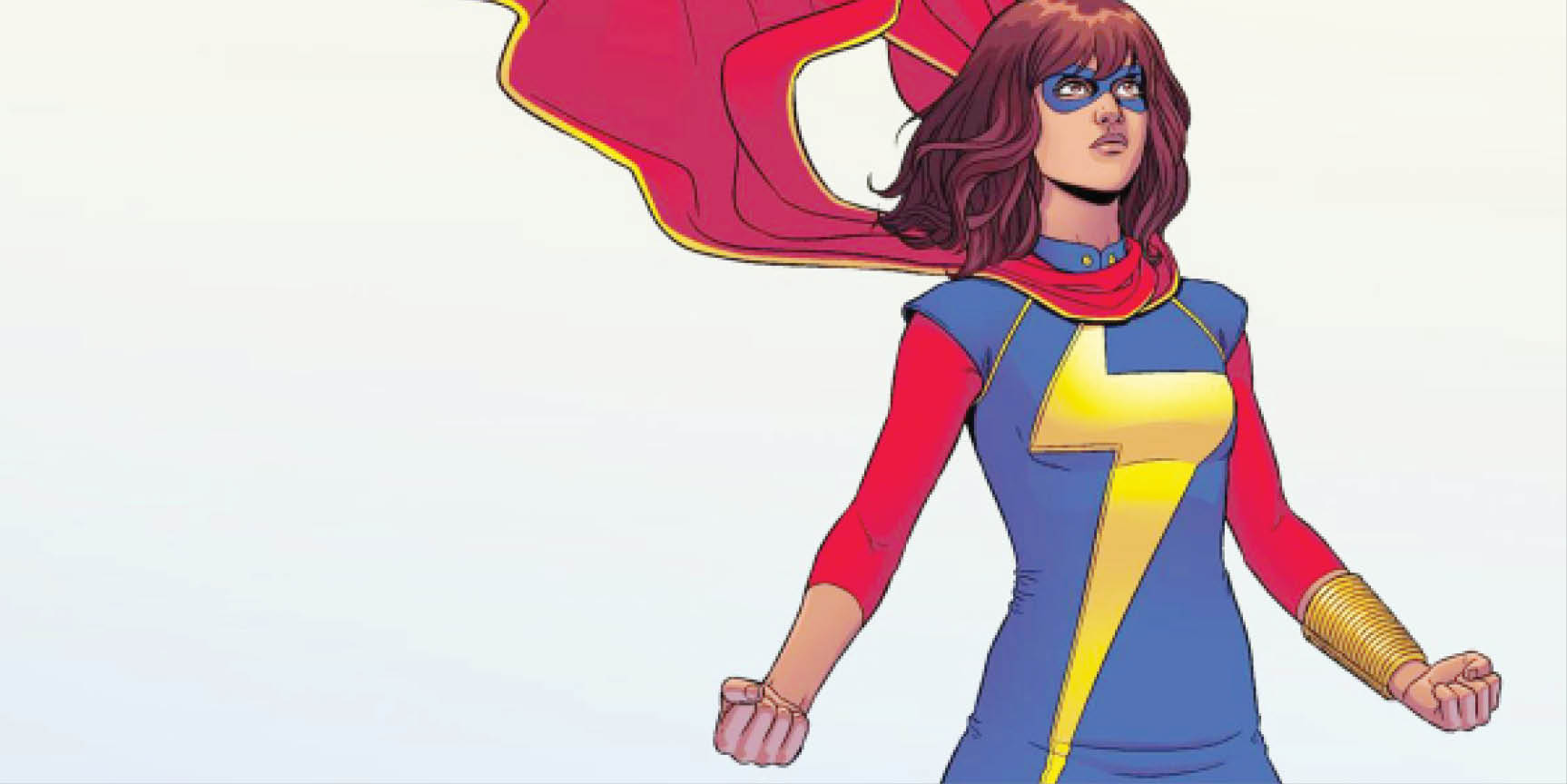The Disney+ series will be Marvel Studios’ first to center on a Muslim character, a group that has been villainized in film and on TV for years.
Marvel Studios is breaking ground with its upcoming Ms. Marvel series for Disney+. As reported by The Hollywood Reporter, Bisha K. Ali has been tapped to write the series and act as showrunner for the series centered on Kamala Khan, a teenage Pakistani-Muslim living in New Jersey.
In 2014, Kamala Khan made history in the comics by being the first Muslim Marvel character to headline her own title. The comic book by G. Willow Wilson focused on the Muslim American diaspora as the Muslim teenager went on her superhero adventures within the larger Marvel universe. The title would go on to win a Hugo Award in 2015 and the character continues to have a strong presence in Marvel comics today. With Marvel Studios’ Captain Marvel finding rousing success among critics and at the box office, the question of when Ms. Marvel would join her immediately entered the fray. On Friday at D23, Marvel Studios president Kevin Feige confirmed the Disney+ series was happening, and added that Kamala Khan would appear in upcoming Marvel films as well.
Kamala Khan coming to the MCU doesn’t just breathe new life into its franchise, it also is an important milestone for Hollywood as a whole.
Hollywood’s interpretation of Muslims has never been great. Muslims have not commonly been the lead of any film or television series. Muslim characters are often pigeonholed into a villainous stereotype; they are terrorists with heavy accents. Whether it be a mid-film challenge, like in Raiders of the Lost Ark, or just bad guy fodder for our heroes to mow down, as in the Olympus Has Fallen film series, rarely will the audience be shown a Muslim in line with reality. If a “good” Muslim does appear, the person is normally given the full foreign treatment such as an angry demeanor, heavy accent, large beard and ultra-conservative stance. For Muslim women, the representation is even narrower, with the choices largely being a frightened woman in a burka or a belly-dancer.
While the use of the terrorist Muslim stereotype was greatly increased after 9/11, examples of this trope existed well before that. Films like True Lies (1994) and The Siege (1998) featured the one-dimensional Muslim bad guys that exist to just be killed for laughs. The imagery of a gun-slinging white man gunning down faceless, nameless Muslims while audiences guzzle popcorn has been a mainstay of Hollywood for years.
The trend continued, even in the era of peak TV. Showtime’s Homeland, alongside shows like Sleeper Cell, 24 and NCIS, are known for their one-dimensional stance of Muslims being either terrorists or informants to stop said terrorists.
While not in abundance, there have been moments in Hollywood where Muslims were better represented. Films that covered historical figures and events like Malcolm X (1992) and Ali (2001) represented its subjects’ faith accurately, while Ridley Scott’s Kingdom of Heaven (2005) did a great job showcasing Muslims as three-dimensional characters. But in general, Muslims characters are not presented with Muslim audiences in mind. Films like 2016’s London Has Fallen, which opened a new installment last weekend, was dripping in stereotypes and slurs, with Gerard Butler’s protagonist shouting, “Get back to Fuckheadistan, or wherever you’re from,” to the Muslims he is killing in the film.
To show just how narrow the representation of Muslims really is, a group of British friends and film buffs created the Riz Test in 2018 to focus on Muslim depictions in Hollywood. The test, inspired by the Bechdel Test and named for musician and actor Riz Ahmed, works this way: if a Muslim character is talking about, the victim of, or the perpetrator of terrorism, the show or film fails. Other ways to fail the test: is the character irrationally angry? Culturally backward? Fail. The full list of ways to fail is here.
A Pew Research study based on the 2010 census found that nearly half of all Muslim Americans in the United States were born in the country, while a Pew study from a year earlier showed that more than 80 percent of all Muslims living in the country speak English well. This would be a far cry from how Muslims are normally shown in our films and on television.
In Hollywood, the concept of a Muslim character saving the day, let alone being a superhero, is unheard of. Take your standard Muslim American family: they are not much different than any other American family. Yet, most American families from other backgrounds will have positive characterizations available to them in the media. The average white male will have dozens of superheroes and protagonists who look like them. There will be sitcoms, comedies and office dramas depicting life for the average white family and environment. Even though it took a while, other groups are starting to get positive representation. While there are a ways to go, shows like ABC’s Black-ish and Fresh Off the Boat are starting to give minority families a more genuine reflection of themselves. On the big screen, Crazy Rich Asians, Black Panther, Spider-Man: Into the Spider-Verse and more are changing the tide and showing Hollywood that representation will lead to box office success.
For Muslims, this is something that is desperately needed. With the superhero medium being among the biggest platforms around, there is no better place to make a stand than there.
Kamala Khan is not a CIA informant trying to root out terrorists, nor is she a caricature Muslim woman lost in a western world. She is exactly what many Americans teenagers are today. Much like Spider-Man, Kamala’s primary day-to-day struggle is just life as a teenager from a middle-class family in urban America. Her experience is elevated and changed by her faith and cultural background. Her faith in Islam is never seen as a burden, nor does she have the weight of somehow being responsible for lunatics that twist the religion. She is simply Muslim, and that’s exactly what she needs to be. When tackling the character, writer G. Willow Wilson wanted to show the life of a typical Muslim American teenager, who happens to get superpowers and thus balance these two distinct lifestyles. Remove Ms. Marvel’s Islamic faith and Pakistani culture, and she is not too different from your standard teenage superhero from DC or Marvel. With both the culture and faith intertwined with her, you get something truly special and unique.
Growing up as a Muslim American in the 1990s, I almost never felt I was seeing myself on screen. The few times where I would see a Muslim- or Arab-looking person, such as in 1992’s Aladdin, the only takeaway was that the heavier the accent, the more villainous the character was. Instead, I turned to superheroes, and naively assumed Superman was Muslim like me and that his tanned look in Superman: The Animated Series meant that he was brown like me as well. As a focus on representation continues, today’s youth will have more options, including those that actually look and sound like them.
Hollywood is in the middle of a potential paradigm shift in representation and superheroes are in a big way at the forefront. Marvel is moving forward with Shang-Chi, which will be a chance for an Asian superhero to lead his own film. Mahershala Ali will likely be the first Muslim actor to lead a superhero film in Blade. Over on the DC side of things, Aquaman ruled the box office seas with $1 billion and has a second film on the way starring Jason Momoa, who has native Hawaiian roots. Ms. Marvel’s announcement only adds to and furthers this new reality.
When Ms. Marvel makes her debut on Disney+, it may be a game changer. For the first time, Muslims Americans may see a series that attempts to capture the daily trials, tribulations, joys and challenges that come with living in America.
Source: THR.com




